By Eric Abena
Although the Almighty has no need of human trumpeters to defend His own, recent subjective media reports have compelled me to comment on the ongoing and contentious issue of Prophet T.B. Joshua, a name that can’t seem to leave the news since his well-publicized prophecy concerning the sudden demise of Malawi’s President Bingu wa Mutharika.
My purpose of writing this is not in any way an attempt to ascribe glory where it is not due or put any man on a pedestal he has no right to ascend. I simply wish to share my personal convictions on this issue in an attempt to correct the erroneous judgements formulated by many based on isolated incidents and doctored media reports, as opposed to seeing the bigger picture within the boundaries of context and consistency.
Firstly, the sudden flurry of online reports pertaining to T.B. Joshua supposedly being banned from Cameroon, aside from being blown unnecessarily out of proportion, is a case of irresponsible journalism. The said communiqué was actually released almost two years ago in September 2010, the issues therein which I addressed in an article titled, ‘The T.B. Joshua Phenomenon in Cameroon.’ Mr. Ayissi has since left his post as Foreign Minister, partially due to the negative backlash from the people to this notice. The said communiqué has done little to discourage the flow of Cameroonians to The SCOAN, as any viewer of Emmanuel TV or visitor to The SCOAN will attest to. I am a Cameroonian myself and can safely say that T.B. Joshua is still a phenomenon in my country, his popularity and patronage showing no signs of waning. As my neighbour told me last week, “This man makes God popular,” with homes across the nation literally glued to Emmanuel TV every Sunday.
T.B. Joshua’s prophetic ministry has been the subject of extensive media attention of late, with derisive questions asked of both the subject matter of his predictions and the vague parabolic language often used. Coming from a background of scientific study and spiritual apathy, I do understand such mindsets. When I first heard Joshua’s prophecies, I was initially sceptical due to the hazy terminology of some coupled with the view that they could be related to multiple circumstances. However, consider the consistency of accuracy of his words over several years, amidst the boldness to make such proclamations in public on a live television broadcast. Such declarations, with subsequent events confirming their accuracy, cannot be the mere product of human trickery, especially in consideration of the specific details and dates given on numerous occasions.
However, the main thrust of this piece is to look at these prophecies in the context of other happenings in The SCOAN, hoping that such will provide a platform to sufficiently indicate the source of Joshua’s predictions. Take for instance the manner in which T.B. Joshua prophesies to individuals in his church services every Sunday. It is simply astounding! The depth of detail, reactions of the individuals concerned and their accompanying confirmations/ testimonies are all too numerous and pin-pointedly accurate to be classed as fake or fraudulent. Even Ghana’s respected leader, John Atta Mills, publicly testified that Joshua prophesied specific details of his three-round election victory and ascension to power in 2008. I challenge anyone who claims the origin of such are the clever manipulative whims of a con man to watch any live Sunday Service broadcast on Emmanuel TV and subsequently argue their point.
The words of a man do much to reveal the internal workings of his heart. I have carefully listened to and examined Prophet T.B. Joshua’s messages for several years and find them spiritually enriching, biblically sound and replete with practical truths of life. Unlike his counterparts in the vineyard, many of whom have publicly denounced him, his messages do not condemn, vilify or produce inter-religious tension. He teaches in ways that people can understand, relate to and apply into their daily lives and situations, stressing on the importance of love and being a Christian in action and not mere confession. I have sat and watched Emmanuel TV with respected Bible scholars who have marvelled at the simplicity, authority and practicality of his teaching.
The SCOAN demonstrates practical and biblical Christianity; the fruits speak for themselves. Marriages on the brink of divorce are reunited; families torn apart by wild accusations are reconciled; armed robbers, prostitutes and militants are rehabilitated. The rejected and neglected in society are provided for. What of the deliverance each and every Sunday? I have never witnessed deliverance of its type, a situation where individuals sitting down calmly in church will, upon prayer, suddenly grow aggressive and confess all nature of atrocities. Their ensuing testimonies and life experiences tell of inexplicable bondage and the joy and peace experienced following their visit to SCOAN.
In the midst of this, five ministers of God have been raised up under Prophet T.B. Joshua, performing miracles, releasing prophecies, ministering deliverance and preaching the Word in a strikingly and similarly powerful vein. Known as the ‘Wise Men’, they stand, for me, as the greatest attestation to the authenticity of Joshua’s ministry and calling. For the gift of God in his life to be imparted to others, it testifies of a legacy that will live on long after Joshua has left.
As many may insinuate, this is not a cheap publicity stunt for the church. I am simply encouraging people not to come to a quick conclusion on Prophet T.B. Joshua based on hearsay, rumours or isolated media reports with politically motivated undertones. On Sunday 6th May 2012, Prophet T.B. Joshua said, “The consistency of what you are doing confirms the genuineness of your calling.” To my mind, the test and testimony of time has spoken strongly to reveal Joshua is doing the work of His Father above. Perhaps we really do have a Prophet in our midst.

